Purpose of Solution Manager in Sap
SAP Solution Manager (sometimes referred to by admins as "SolMan") is an application lifecycle management (ALM) platform used to implement, maintain, and integrate SAP systems; troubleshoot issues; and keep things running securely, cleanly, and smoothly. As the main administrative solution for SAP users, SAP Solution Manager combines a handful of tools alongside content and direct access to SAP to ensure reliability and stability of solutions. Its numerous applications can be categorized into one or more of the defined Information Technology Infrastructure Library (ITIL) stages of service strategy, service design, service transition, service operation, and continual service improvement. SAP Solution Manger is part of every SAP installation and all SAP customers use it. It is currently on release 7.2. SAP Solution Manager was first released in the mid-2000s and served as a project implementation tool and support system for SAP solutions only. Users found this limiting as its capabilities focused around the IT department and not the business. SAP remedied this in subsequent releases by opening up SAP Solution Manager to handle not only SAP products, but also integrated systems, partner products, and even non-SAP software. In 2016, version 7.2 was released to the public and continues to be the main release of SAP Solution Manager. It is the only release currently supported by SAP. Intermittent service packs for 7.2 are released regularly, with the latest being SPS 10, which became available in December 2019. (Back to Toc.) SAP Solution Manager, in short, serves as the central hub through which SAP solutions can be implemented and maintained. System administrators looking to make changes to an IT environment, monitor solutions in real time, integrate new solutions (on-premise or cloud), test updates to solutions, document business processes, control access rights, and more, will utilize this tool. (Back to Toc.) Eager to learn more about the things one can do with SAP Solution Manager? Here's an overview of the items listed in the paragraph above. Change Request Management (ChaRM) is an application management process of documenting and controlling the approval process for changes that need to be made to a system. This is important for troubleshooting down the line—if something doesn't work admins can look at a history of changes to see where things may have gone off the rails. SAP Solution Manager allows admins to perform ChaRM. Key features of ChaRM include: These functionalities are available out of the box but SAP also allows for customization for a business' unique needs. SAP Solution Manager provides a handful of tools to utilize when monitoring solutions for efficiency and technical issues; these tools are part of Application Operations. This incredibly complex tool monitors systems and should be carefully configured in order to provide a report that is actionable. It provides valuable alerts for all sorts of scenarios for both SAP and non-SAP applications, as well as the databases and operating systems they run on. This tool monitors performance and availability of systems from the user's perspective. This is actually three separate tools all focused on the same thing: the connections and flow of data between systems. The three tools are SAP Process Integration monitoring (for both SAP Process Integration and SAP Process Orchestration), interface and connection monitoring (both on-premise and cloud solutions), and message flow monitoring. These tools focus on business intelligence (BI) to monitor the process chains/queries and data readiness for insertion into a database such as SAP HANA. This tool centralizes monitoring of critical background jobs regardless of SAP application. This tool focuses on SAP Solution Manager itself and its ability to collect data and monitor systems. This tool helps IT teams identify where and why something went wrong. This powerful tool provides a list of notes and patches available for a system, keeping it up to date and free from known vulnerabilities. SAP Solution Manager provides admins with the ability to integrate disparate systems. This is especially helpful for customers running SAP S/4HANA and looking to utilize SAP cloud solutions such as SAP Ariba, SAP Integrated Business Planning, and SAP SuccessFactors. The SAP Solution Manager Test Suite allows for manual and automated testing of both SAP and non-SAP solutions. Users can create and customize tests, sign up for emailed result notifications, analyze potential results from a planned changed, and more. SAP Solution Manager supports detailed documentation of business processes for teams to utilize when onboarding new employees or learning to use a solution themselves. Library functionality allows for reusing existing documentation and customizing it as needed, while the Business Processes area allows IT and business users a chance to define their perspectives. SAP Solution Manager acts like a security tool by providing IT admins the ability to control who accesses what within SAP Solution Manager and when. A variety of roles have already been created by SAP and can be assigned to non-essential users as needed, and tailoring is available if existing roles don't meet specific needs. (Back to Toc.) When adding a solution into SAP Solution Manager, you should be aware of the software components you'll need to add first. These are known as logical components. Below is a list of the components. This is the representation of a landscape, built out over time as you connect solutions to SAP Solution Manager. These are a virtual representation of systems and business processes. There are six different standard branches, but a branch can be used for any scenario required. This branch represents the productive business processes in use. This is a locked area; changes to this branch must be made in one of the other branches, named "child branches." This branch is a clone of the production branch and stores business process monitoring metrics (such as KPIs) and alerts. Any changes made to the production branch are simultaneously reflected in the operations branch. This branch creates and updates business processes, such as minor updates needed in a short period, on a daily basis. It is also used to fix bugs or deliver new enhancements to the production branch. This branch designs and creates new business processes for future release. Major enhancements or projects are built in this branch. This branch edits or redesigns business processes imported from an SAP Best Practices package. This branch imports SAP Best Practices packages and releases business processes into the design branch before sending them further up the system. These are logical components that dictate what solutions are under Change Request Management (ChaRM) control. These are templates for solutions to be based on. This might include functional or technical specifications, scripts, or Microsoft Office-based templates. These are SAP-provided templates on which solutions can be based. They can be procured from the SAP Service Marketplace. These are metadata consisting of a solution's creation date and other relevant information such as change date. (Back to Toc.) Other Key SAP Solution Manager Terms In addition to the information laid out above, there are a handful of important SAP Solution Manager terms you should also be familiar with. Here are they are in list form: (Back to Toc.) Want to learn more about SAP Solution Manager? Additional information can be found in the blogs and books listed below. Learn more SAP from our official Learning Center. And t o continue learning even more about SAP Solution Manager, sign up for our weekly blog recap here: SAP Solution Manager
Table of Contents
History of SAP Solution Manager
What Does SAP Solution Manager Do?
Key SAP Solution Manager Functionalities
Change Request Management
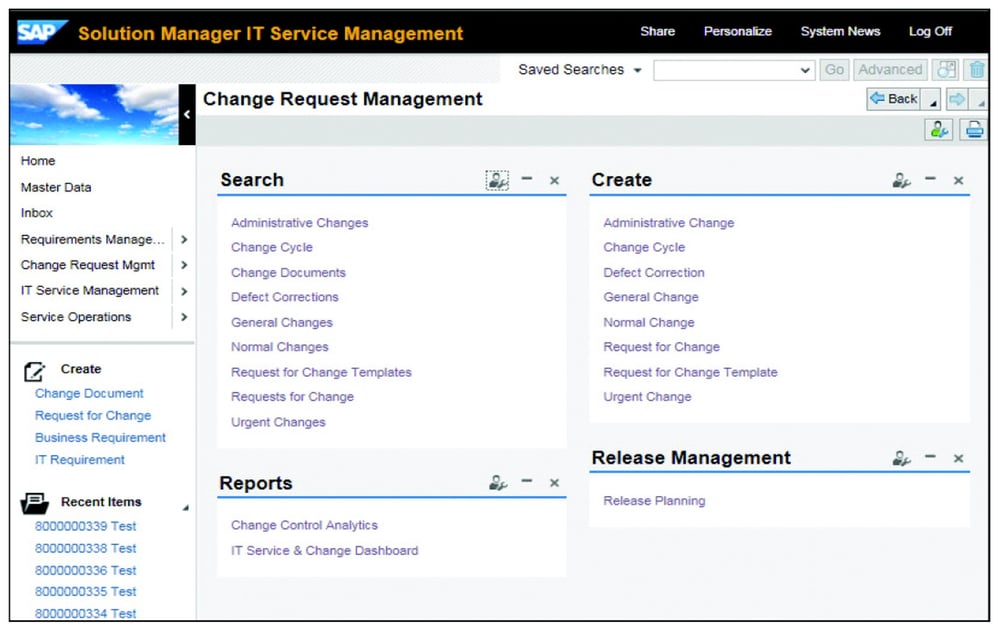
Application Operations (Solution Monitoring)
System Monitoring
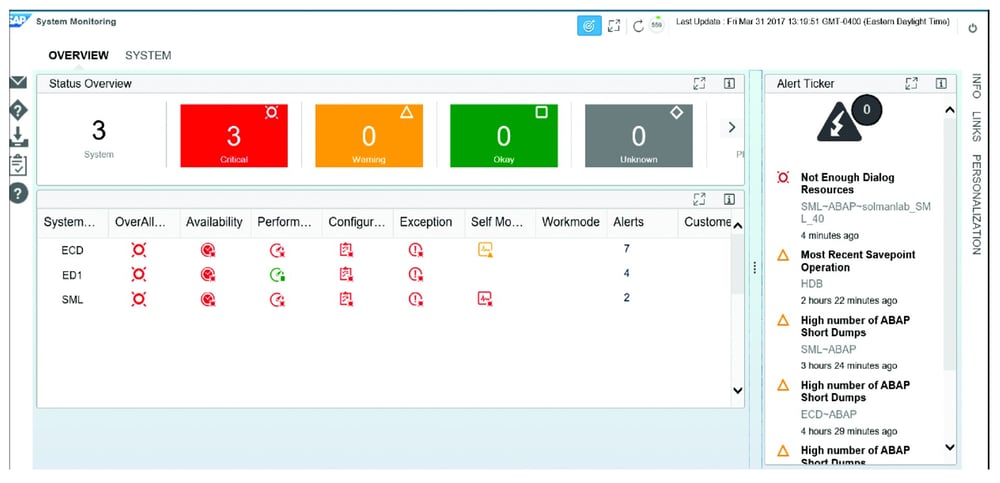
User Experience Monitoring
Integration Monitoring
SAP HANA and Business Intelligence Monitoring
Job Monitoring
Self-Monitoring
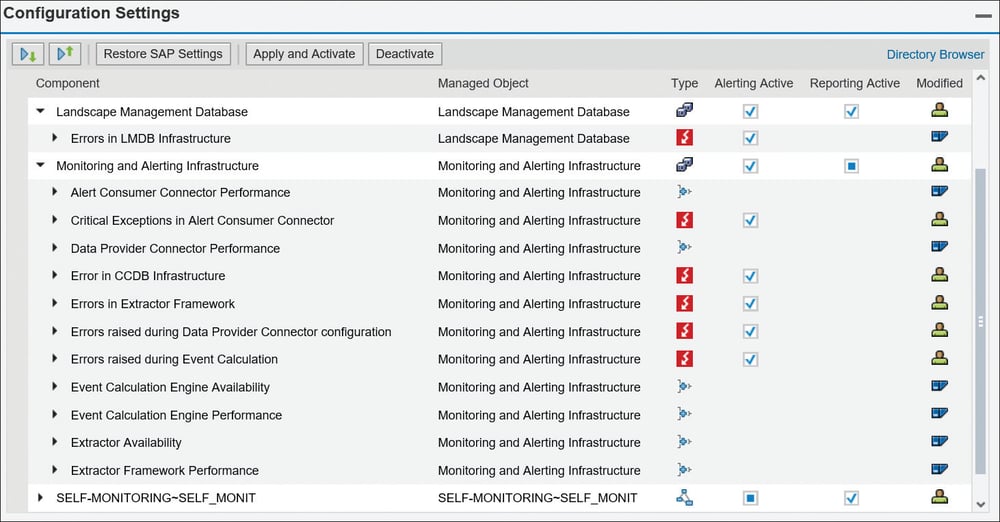
Root Cause Analysis
System Recommendations
Solution Integration
Solution Testing
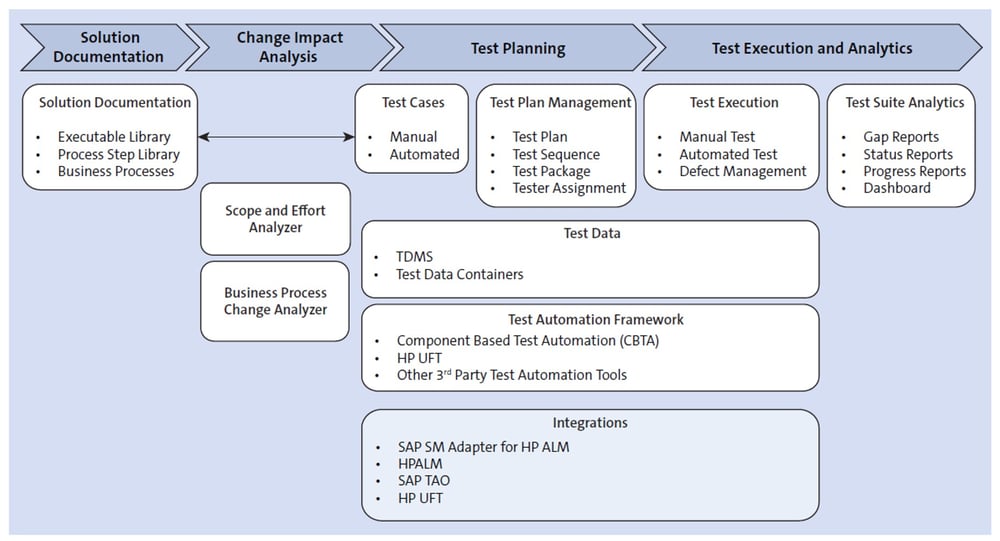
Business Process Documentation
Access Control
Technical System Landscape
Branches
Production
Operations
Maintenance
Development
Design
Import
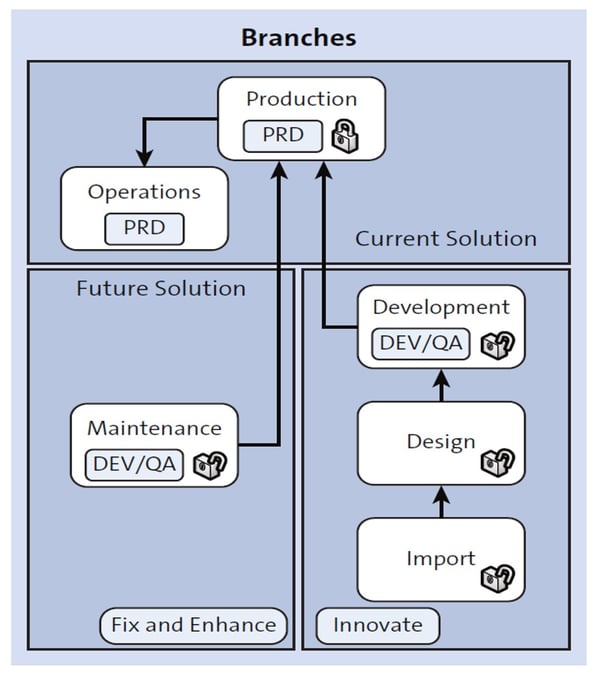
Change Control Landscapes
Document Types
SAP Best Practices Packages
Properties
Additional Resources
Blog Posts
Books by SAP PRESS
What Next?

Purpose of Solution Manager in Sap
Source: https://learning.sap-press.com/sap-solution-manager